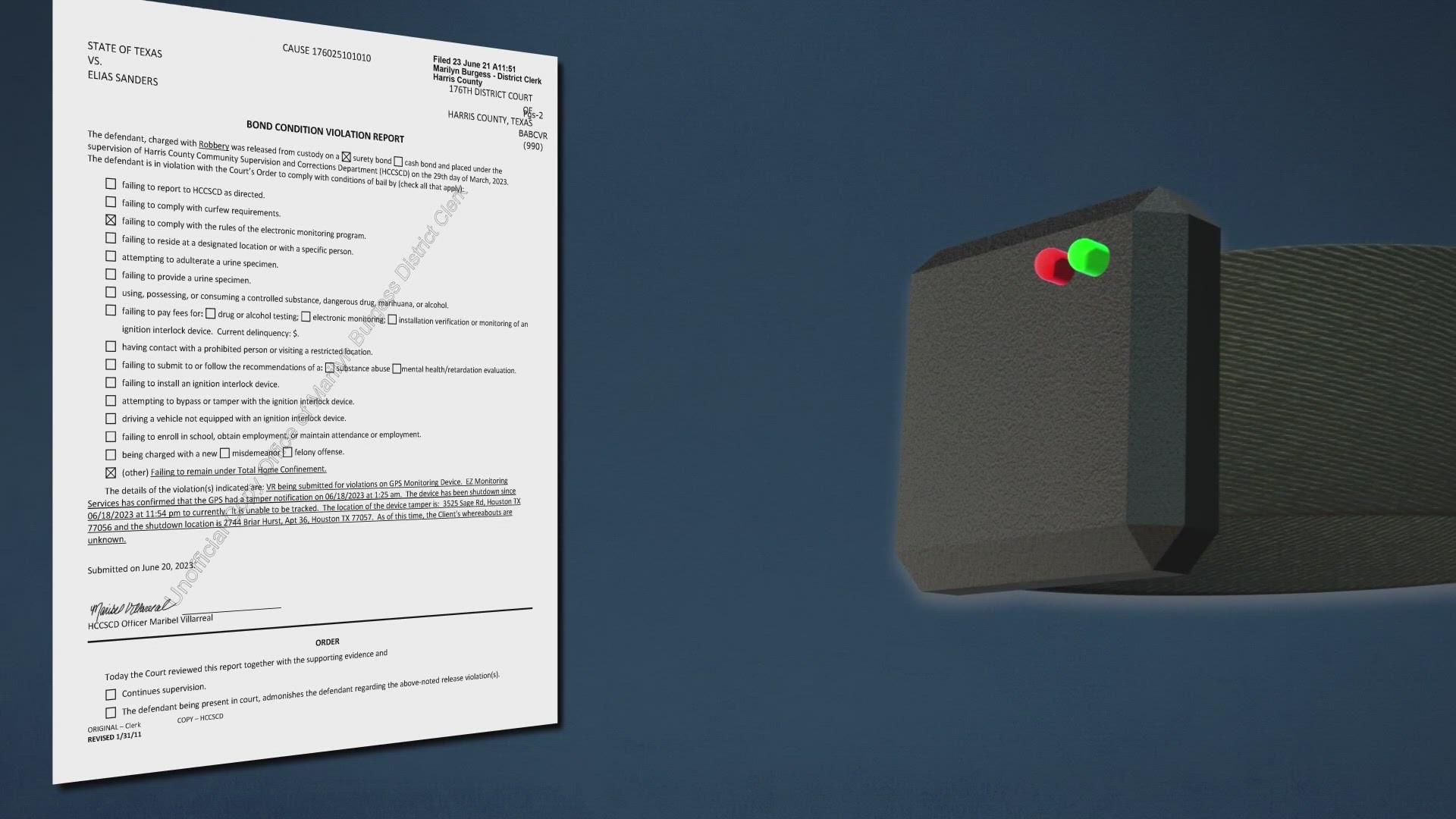HARRIS COUNTY, Texas — Harris County judges are ordering more and more accused felons to wear ankle monitors, but when those defendants break the rules and violate their bond conditions, judges often don’t order them back to jail, a KHOU 11 analysis of court records has found.
Pete Torres is one of those accused criminals. Charged with aggravated kidnapping, records show he violated his ankle monitor conditions by failing to comply with curfew requirements -- not once or twice -- but on 18 separate days last November and December. See bond condition violation report below.
When notified of the bond violation report on Dec. 19, Judge DaSean Jones did not issue a capias warrant for the arrest of Torres. Instead, he set the matter for a hearing more than two weeks later. When Torres appeared in court, Jones gave him “one more chance” and let him go.
He’s not alone.
Nothing happened to Heriberto Cervantes either. Bond violation reports show Cervantes also blew through curfew hours multiple times and had a dead ankle monitor battery. Judge Natalia Cornelio never revoked his bond.
“It’s very, very frustrating,” said Scott Brogan.
Brogan was allegedly beaten by Cervantes in his own home.
“The judge is responsible," he said. "The buck stops with the judge."
KHOU 11 Investigates analyzed a year of violent cases from Nov. 2022 to Nov. 2023. Harris County judges only issued an arrest warrant within a week of a bond violation report 32% of the time.
“That needs to be dealt with ASAP,” said Andy Kahan, director of victims services and advocacy for Crime Stoppers of Houston. “There’s no sense of urgency, and there should be urgency.”
Kahan said when you read the ankle monitor violation reports, the risk to the public is clear. They show accused violent felons whose “whereabouts are unknown” or “who failed to answer any calls from the monitoring company.” Many reports bluntly state “we are unable to supervise” the defendant, “how would the court wish to proceed?”
“You know, for the love of God take that report, treat it like you would with someone else who broke out of prison,” Kahan said.
Instead, five Harris County judges hardly ever issue speedy warrants for the arrest of ankle monitor violators, according to the KHOU analysis of a year of court records. In the 184th criminal court, Judge Katherine Thomas did so in 2% of cases. It was 3% for Judge Frank Aguilar in the 228th criminal court. Judge Natalia “Nata” Cornelio did so 6% of the time in the 351st Criminal Court, as did Robert Johnson in the 177th Criminal Court. And it was 8% for Judge DaSean Jones in the 180th criminal court.
“It’s a bad formula,” Harris County District Attorney Kim Ogg said. “Those are the red flags for high-risk offenders that need action immediately in order to protect the victim and everybody else.”
The judges mentioned in this story declined interview requests and released the following joint statement:
“As presiding judges of the Harris County State Criminal District Courts, who took an oath to uphold the law and follow the constitution, are required to be fair and impartial in each case. Bond violation reports (BVR) represent an allegation, not evidence, of a defendant’s noncompliance with some aspect of the bond condition, including GPS monitoring. GPS devices are useful but not infallible tools. Bond violation reports can include a range of allegations, including technical issues related to a malfunctioning device, alleged curfew violations, and serious incidents like tampering with or removing an ankle monitor.
After reviewing the BVR, the court has the discretion to use multiple effective methods to ensure the defendant’s appearance, such as notifying attorneys or bondsmen, issuing court orders, or issuing a capias. Before determining whether a bond violation occurred, the judge holds a hearing where the State and Defense are afforded the opportunity to present evidence. After the hearing, the case may resolve through plea, dismissal, bond revocation or adjusting bond conditions.
In each of these cases, the courts acted consistent with the law by hearing from all parties and making decisions based on the evidence presented. To comment further about specific cases would violate Judicial Canons and Rules of Judicial Administration.”

